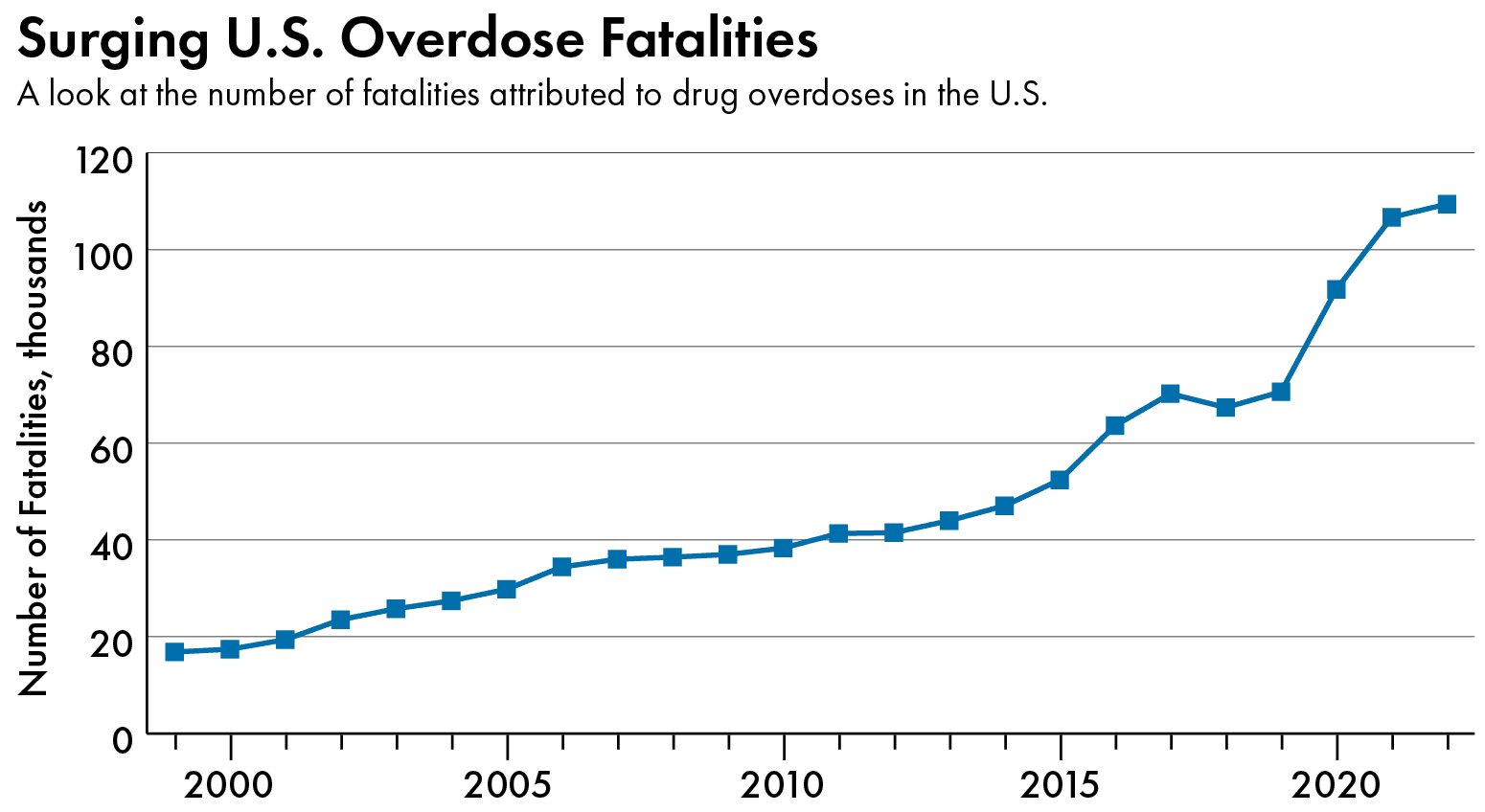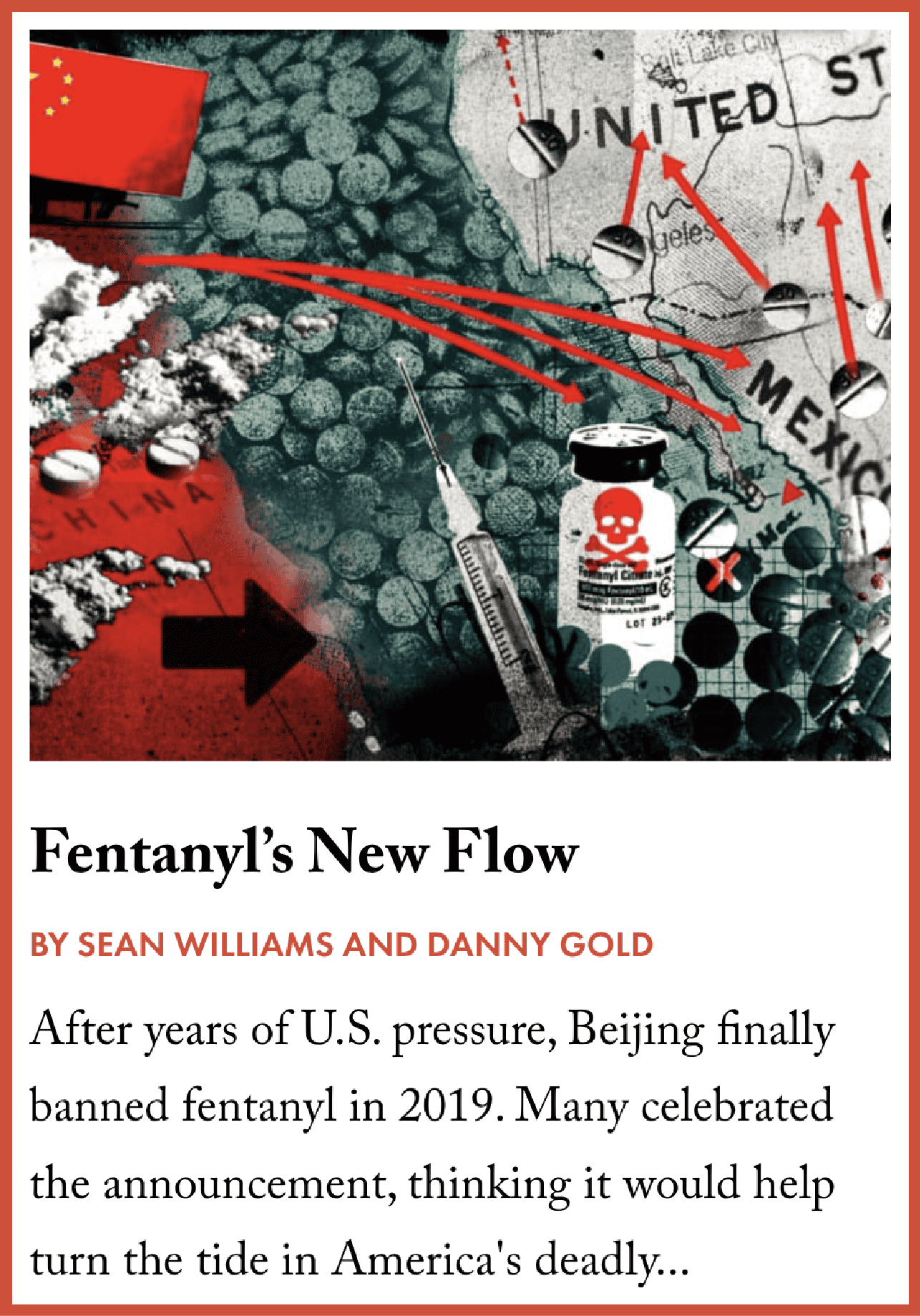
In late January, officials from the U.S. and China convened in Beijing to discuss an enduring sticking point in the relationship, as well as a deadly public health crisis across America: fentanyl trafficking.
On paper, the new working group represents a bright spot amid darkening Sino-American tensions and a positive step towards addressing fentanyl-related deaths, which continue to surge. Last year, U.S. overdose fatalities reached 105,000, with the vast majority involving opioids like fentanyl.
U.S. Attorney General Merrick Garland announcing eight indictments against China-based chemical manufacturing companies and employees, October 3, 2023. Credit: The Justice Department
Three months into the bilateral cooperation, however, it is clear that making a meaningful dent in the illicit drug supply will require deep collaboration and compromise at a time when the two countries are wary of both. Moreover, recent pressure from Capitol Hill about the Chinese government’s role in the fentanyl industry underscores the fraught political backdrop against which the countries are taking steps towards working together.
“There is no easy switch [whereby] China starts cooperating, and deaths start going down,” says Vanda Felbab-Brown, a drug policy expert at the Brookings Institution. “What we want to see is meaningful cooperation instead of willful denial of cooperation.”
Since the advent of prescription opioids like OxyContin in the 1990s, the U.S. has been plagued by an increasingly severe opioid crisis. Over the last decade, the crisis has been primarily driven by lethally potent fentanyl, a so-called ‘synthetic opioid,’ meaning it is produced in a laboratory. For several years, China was the primary source of fentanyl-related substances trafficked into the U.S., according to the Drug Enforcement Agency (DEA).
In 2019, after years of pressure from U.S. officials, the Chinese government designated fentanyl as a controlled substance, which resulted in a sharp drop in direct shipments of the drug to the U.S. from China. But in the latter part of the Trump administration, as overdoses reached new highs during the Covid-19 pandemic, communication on counternarcotics between the U.S. and China completely broke down. Traffickers, meanwhile, found a way around China’s new designation: Chinese companies increasingly sell the precursor chemicals which go into fentanyl to third countries like Mexico, according to a U.S. government-commissioned report from RAND, where cartels assemble the drug for American customers.
The communication restart, initially brokered at the summit between Presidents Biden and Xi in November, has already yielded concrete results. For the first time in nearly three years, the Chinese government has started sharing information on suspected trafficking activity with the International Narcotics Control Board, a Vienna-based organization set up by a United Nations treaty, according to U.S. officials.
Because of the competitive nature of the [Chinese] chemical industry, they operate on thin margins, so there is an incentive for small manufacturers to expand their profit margin.
Zongyuan Zoe Liu, a fellow at the Council on Foreign Relations
In November, China’s own National Narcotics Control Commission, the body responsible for counternarcotics work under the Ministry of Public Security, also issued a notice warning companies against engaging in the illegal fentanyl precursor trade.
But the U.S. is pushing for more bilateral law enforcement cooperation — such as its officials sharing more information on problematic companies and individuals for the Chinese police to prosecute. There is precedent for this: starting in 2017, the U.S. and China worked together on a case which resulted in a Chinese court imprisoning nine people for trafficking fentanyl.
U.S. officials are also hoping to collaborate with China on targeting the illicit financing of fentanyl networks and advocating for China to implement ‘know your customer,’ or KYC, regulations, which would force Chinese companies to put in place due diligence protocols to prevent known criminal groups in Mexico and elsewhere from buying precursor chemicals. This sort of step is seen as particularly important because many fentanyl precursors are not individually subject to Chinese or international controls, as they are also required for the manufacture of legal drugs.
“If you know who your customer is, you might know that that person is unlikely to use those benign precursor chemicals for benign reasons,” says Regina LaBelle, the former acting director in the Office of National Drug Control Policy in the Biden administration, who now works at Georgetown University.

Yet Chinese officials do not seem eager to put in place these measures. Instead, Beijing seems keener to put the onus on American policy makers to address its domestic issues that are leading to fentanyl abuse.
“The ‘know your customer’ practice that some in the U.S. have been asking about far exceeds the UN obligations,” Qin Gang, China’s former foreign minister, said in a 2022 interview with Newsweek. “According to international practices, it is up to the importer and importing country to ensure that imported goods are not used for illegal purposes, not the exporter.”

The common narrative in the U.S. holds that the Chinese government could quickly wipe out illicit fentanyl production given its control over society and the economy. But there are still practical implementation barriers, including varying capacity and motivation at the local and provincial government level, as well as the scale of the sprawling chemical industry. China is the world’s largest producer and consumer of chemical products, according to the Rocky Mountain Institute, with numerous companies, from small to large, operating within the sector.
“The nature of Chinese policymaking is fragmented: I do think that we are counting too much on the central government’s ability to effectively deliver the promises,” says Zongyuan Zoe Liu, a fellow at the Council on Foreign Relations.
“A major barrier is the economic incentive on the chemical manufacturer level. Because of the competitive nature of the [Chinese] chemical industry, they operate on thin margins, so there is an incentive for small manufacturers to expand their profit margin,” she adds.
There could potentially be a balloon effect from another country as a source. So even if there’s cooperation with China, you squish down one part of the balloon and it pops up somewhere else.
Regina LaBelle, the former acting director in the Office of National Drug Control Policy in the Biden administration
In fact, there are good reasons to believe that Beijing would be keen to overcome the domestic barriers to clamping down on the fentanyl trade. The potential upside of doing so is huge, both in establishing trust in the relationship and forcing specific U.S. concessions. For example, at China’s request, U.S. officials removed the Ministry of Public Security’s Institute of Forensic Science from the Commerce Department’s Entity List in November, in exchange for fentanyl cooperation.
The Chinese government is also eager to prevent the “reputational hit” of being associated with a deadly trade, says Felbab-Brown. “China wants the Congress to stop criticizing China for fentanyl,” she says, “though of course, the U.S. executive branch does not have the capacity or interest to muzzle the Congress.”
This reputational damage was on full display this week, when the House Select Committee on the Chinese Communist Party held a hearing and released a report arguing that the Chinese government supports the fentanyl industry, including with state subsidies and investments, and systematically fails to prosecute fentanyl manufacturers.
“As President Reagan once said, ‘If you want more of something, subsidize it,’” Representative Mike Gallagher, the chairman of the Select Committee, said at the hearing. “Through its actions, the Chinese Communist Party is telling us that it wants more fentanyl entering our country. It wants the societal chaos and devastation that has resulted from this epidemic. And yes, it wants more dead Americans.”
In a press conference on Wednesday, Todd D. Robinson, assistant secretary of state in charge of international narcotics work, refuted the report’s thesis. “We have no evidence that the Government of the PRC is deliberately directing the shipment of illicit drugs into the United States, and in fact we know back in 2019, when we asked the PRC to stop shipments of fentanyl directly to the United States, they did that. So that was a sign of their willingness to work with us on this issue.”

Before the working group was set up, the Biden administration took several unilateral actions against Chinese fentanyl networks. In 2023, the Department of Justice announced eleven indictments against Chinese companies for fentanyl-related crimes and the U.S. government placed China on a list of countries most involved in illicit drug production or transit. That same year, the U.S. Department of State launched the Global Coalition to Address Synthetic Drug Threats, an international initiative, which does not include China, to combat the threat of synthetic drugs.
China is also not the only source of the problem. Even if the working group effectively tackles Chinese fentanyl precursor supply, experts warn that Mexican cartels are becoming increasingly adept at synthesizing these drugs themselves, and India could become a significant source given its large chemical industry. In other words, if there continues to be demand for these drugs in the U.S. due to widespread addiction and substance abuse issues, there will also be a supply.
“There could potentially be a balloon effect from another country as a source,” adds LaBelle. “So even if there’s cooperation with China, you squish down one part of the balloon and it pops up somewhere else.”

Katrina Northrop is a former staff writer at The Wire China, and joined The Washington Post in August 2024. Her work has been published in The New York Times, The Atlantic, The Providence Journal, and SupChina. In 2023, Katrina won the SOPA Award for Young Journalists for a “standout and impactful body of investigative work on China’s economic influence.” @NorthropKatrina




